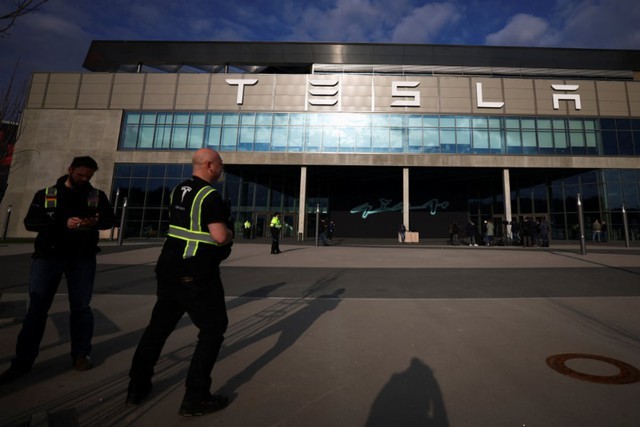Tesla Factory Damaged, $1 Billion Loss, Production Halted by 1,000 Cars per Day

An environmental activist group known as the “Volcano Society” recently vandalized the Tesla factory in Germany, resulting in a total loss of $1 billion. This incident occurred on March 5th, 2024, causing substantial damage to the factory’s infrastructure and forcing a production halt of 1,000 cars per day.
The Attack and its Consequences
The Volcano Society targeted the high voltage power line near the Tesla factory located in Grunheide, Germany. This act of sabotage led to a power outage affecting over 60,000 residents in Brandenburg and some areas surrounding the capital city of Berlin. The incident has raised questions about Germany’s ability to protect its critical infrastructure from such attacks, whether perpetrated by environmental activists or criminals.
The group responsible for the attack issued a statement referring to Elon Musk as “Elend” (meaning “misery” in German) and declared the destruction of his Gigafactory as a step towards liberation.
Andre Thierig, a senior executive at Tesla Germany, estimated the damage to be close to $1 billion, with the production of 1,000 cars per day being interrupted as a result.
Impact on Tesla and the Future of Gigafactory
The Tesla Gigafactory in Germany is the company’s first in Europe and primarily focuses on manufacturing Model Y vehicles for markets with left-hand drive, including Germany.
Elon Musk expressed frustration, calling the perpetrators “the dumbest eco-terrorists on the planet” upon learning about the attack on the Tesla factory.
Although the factory has emergency power supply capabilities, it requires a local substation to connect to the high voltage grid. Unfortunately, the environmental activists severed the connection between the substation and the high voltage grid, rendering the emergency power supply useless.
The lack of electricity prevented the factory’s ventilation system from functioning, forcing 12,500 employees to leave the premises and wait for several days until the power grid is repaired.
Thierig stated that production might not resume within the current week due to the extent of the damage.
Addressing the Issue of Infrastructure Protection
The culprits responsible for the attack have not yet been apprehended. Similar acts of sabotage have occurred in remote areas of Germany in the past, where self-proclaimed environmentalists destroyed power cables, communication cables, and even railway tracks.
Although smaller groups carry out these acts of sabotage every one to two years, they are not considered a serious concern by the government.
The German Federal Association for the Protection of Critical Infrastructure (BSKI) has highlighted the need for better protection of essential infrastructure, comparing it to the security measures implemented for military facilities.
Hans Walter Borries, the Deputy Chairman of BSKI, emphasized the importance of safeguarding critical infrastructure for business operations.
Challenges Faced by Tesla in Germany
According to Fortune, the group responsible for the recent attack has been planning to target Tesla’s energy supply sources since May 2021, during the construction phase of the Gigafactory. The project faced significant opposition from local residents who camped in nearby forests to prevent the removal of trees for the factory’s construction.
Further complications arose when a report from the local water utility company, WSE, revealed that Tesla’s factory had been polluting the water source for the past two years. The hazardous compounds, such as phosphorus and high levels of nitrogen, were six times above the permitted limit.
These challenges have severely impacted Tesla’s operations in Germany, and similar attacks may persist in the future.
Jörg Steinbach, Minister for Economic Affairs in the Brandenburg region, reassured Tesla by pledging full support and commitment to prevent any future attacks. However, the Federal Ministry of the Interior condemned the sabotage, likening it to terrorism.
The recent incidents, combined with the disruption in Tesla’s European production caused by the Houthi rebel attack in the Red Sea, preventing battery shipments from Asia through the Suez Canal, have dealt a significant blow to Elon Musk’s plans.
Source: Fortune
